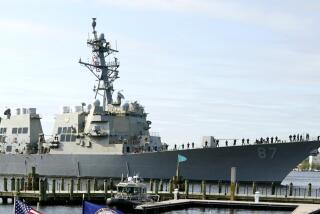Tougher Danube River Monitoring Plugs Leaks in Yugoslav Embargo : Sanctions: But some say tighter enforcement will only result in fiercer defiance by Serbs.
- Share via
VIDIN, Bulgaria — The sleepy Danube River vista that unfolds before the customs office of this gateway to Yugoslav waters may restore some of the international community’s faith in the power of economic sanctions.
Where only a few days ago oil tankers and freighters laden with strategic minerals barged their way past U.N. monitors enforcing a trade embargo against what is left of Yugoslavia, today there is nary a rowboat plying the murky Danube beyond this checkpoint.
Since tougher enforcement measures were imposed Tuesday, the leakiest hole in the punitive cordon erected around Serbia and Montenegro has been thoroughly plugged, although Greek-registered gasoline trucks and the unfettered black-market fuel supply suggest sanctions-busting is still a widely played sport.
Economists and Western diplomats in the Yugoslav and Serbian capital of Belgrade predict that the new vigor with which sanctions are now being enforced will bring the country accused of fomenting the Balkan war to its knees.
But Serbian business people, farmers and the ubiquitous speculators who are getting rich sneer at suggestions that any pain inflicted on the people will prompt them to turn on their nationalist government.
On the contrary, the Serbs insist, the West’s tightening of the economic noose has only provided fresh evidence that the world is Yugoslavia’s enemy against whom only unity and defiance will ensure survival.
“Sanctions have destroyed the middle class in Yugoslavia, the only part of society that could have defined any democratic process,” says Predrag Simic, director of Belgrade’s Institute for International Politics and Economics. “Sanctions have also destroyed our industry, which might have contributed to the economic stability needed to build any democracy.
“We don’t have a single viable alternative now, which is perpetuating a ‘besieged fortress mentality’ uniting the people with this leadership,” he added.
Simic, whose liberal think tank is increasingly out of favor with the Belgrade regime, predicts that stricter application of the embargo will result only in fiercer defiance among embittered Serbs.
That view is borne out in conversations with workers and farmers across ostracized Serbia, where few make any connection between the global punishment and their collective behavior.
Peasants forced to till their fields by hand because a nationwide diesel fuel shortage has idled their farm equipment spit at the mere mention of sanctions and claim the world is out to destroy Serbia.
“We’ll eat roots before we let Germany or the Turks take our freedom again,” hissed one toothless woman, echoing the state-run media view that a German-led conspiracy is aiming to divide the Balkans among the states that have occupied parts in the past.
Others brazenly predict that what Serbia needs will always somehow get through.
“No one can step on the Serbs,” said a young waiter at an empty restaurant in the Danube riverside town of Brnjica. “There is no way to stop all the ships on the river, and the Romanians bring gasoline over for us as often as we want.”
While the governments of countries guarding the Danube gateway to the rump Yugoslavia have pledged their assistance to U.N. forces monitoring the sanctions, small-scale private infractions are beyond anyone’s control. Unemployed Romanians can earn the equivalent of a month’s salary by motoring a few canisters of gasoline by boat to any of the remote, un-patrolled towns along the 170-mile stretch of river they share with the Serbs.
Such trade can make up only a fraction of the goods blocked from entry into what remains of Yugoslavia. But it provides a psychological boost and eases some of the most noticeable shortages.
The unenviable geography of Macedonia has also kept another loophole open for Serbia, as is clear from the steady stream of Greek tankers moving toward Belgrade and the provincial city of Nis from the landlocked republic that is dependent on trade with Serbia for its own survival.
Although European Community monitors have been manning some Macedonian border crossings into Serbia for months, the enforcement staff is too small to maintain 24-hour control. Greek merchants and black-market dealers have managed to keep the fuel lines to Serbia open with a combination of bribes and threats of withholding goods Macedonia needs for itself.
“We can still get what we need from Macedonia,” said Alexandra Vojnic, whose family runs a pizzeria in the town of Negotin, more than 100 miles north of the loosely monitored southern republic. “As you can see, everything is still available here. It’s just that for many people even simple things like fruit and vegetables are now too expensive.”
Vojnic says sanctions have cut deeply into the lifestyle of the average Serbian family. But like most of her countrymen, she sees their imposition as completely unfair and doubts they will contribute to any resolution of the regional bloodshed.
Nedelko Yolov, customs chief for the Vidin region, where 90% of the river traffic consisted of goods from or for what is left of Yugoslavia, insists Bulgaria will do its part to ensure no restricted cargo gets through; this is especially true, he says, now that authorities have been given the power and resources to do the job. Five German military patrol boats and some Russian vessels have been deployed to the Danube, just downstream from the Yugoslav border, to add muscle to what was akin to an honor system.
“All we could do before when we saw ships suspected of violating was to warn them by megaphone. We have only old and very small vessels which could make no serious challenge,” the port official said, recalling a March confrontation during which a flotilla of Ukrainian oil barges powered their way past the enforcers.
Yolov described the original oil and trade embargo ordered by the U.N. Security Council last May as nothing more than a nuisance, because Belgrade simply issued false papers to its ship captains to indicate that their cargoes were bound for other states. “The only vessels we could stop were those whose documents said they were bound for Serbia, and none were so stupid as to try to proceed like that,” he said.
The new sanctions prohibit all transshipment of goods through what remains of Yugoslavia, prohibiting even those trucks and vessels whose end-user certificates have been forged.
But even with credible backup from the European forces patrolling the region, Yolov said he doubts the sanctions will force the Serbs to stop abetting the war in Bosnia-Herzegovina. “You have only to look at Cuba to see that a country can survive a long time even under pressure,” he said.
The Serbs’ Supply Lines
Romania and Macedonia have kept loopholes open to Serbia, which has seen its supply lines throttled by sanctions.
Romania: The unemployed can earn the equivalent of a month’s salary by motoring a few canisters of gasoline by boat to any of the un-patrolled towns along the 170-mile stretch of river they share with the Serbs
Macedonia: Greek merchants and black-market dealers have managed to keep the fuel lines to Serbia open with a combination of bribes and threats
More to Read
Sign up for Essential California
The most important California stories and recommendations in your inbox every morning.
You may occasionally receive promotional content from the Los Angeles Times.











